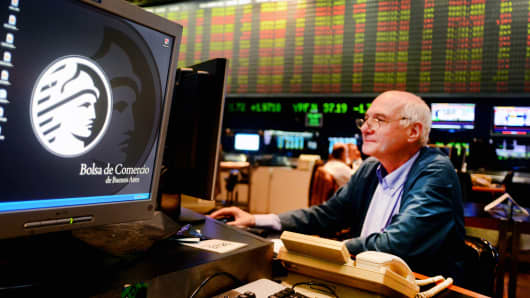With just hours left before markets around the world close for another year, the Buenos Aires Merval Index has logged an annual gain of 58.9 percent – this is the greatest percentage increase compared to other global benchmarks tracked by Reuters.
The index's gains have edged down from mid-September, however, when it had surged 133 percent year-to-date. The wider slump in emerging markets hitting the country's shares.
The index is classed as a frontier market by MSCI and is relatively small, with a market capitalization of just $93.16 billion, compared to the S&P 500's $19.32 trillion.
The bourse contains 14 different stocks, with electric power firm Transener the best performer with a gain of 206 percent year-to-date.
Financial institution BBVA Banco Francés surged 162 percent, meanwhile, and energy company Edenor was also up an impressive 148 percent.
Brazilian-based energy corporation Petrobras was the major laggard with a fall of 30 percent in 2014. This is on the back of a dramatic plunge in oil prices, which have
fallen 50 percent since mid-June.
Venezuela's Caracas Stock Exchange – which has topped the yearly poll for a number of years – had a tough year; the country's economy is heavily reliant on oil exports and has fallen into recession.
Laurence Allan, the head of the Latin America regional team at research company IHS, told CNBC via email that the inability of Venezuelans to access and move foreign assets like the U.S. dollar meant that domestic money found its way into the local stock market.
He said that this also occurred in Argentina, and that shares in both countries had been helped by higher inflation. Argentina's Economy Minister, Axel Kicillof, said this week that consumer prices could grow 15 percent next year, according to local media reports.
"Argentina's economy is still struggling," Allan said. "Our economists at IHS are still forecasting more than 30 percent inflation for 2015, and -1.6 percent forGDP (gross domestic product) growth."
Argentina's currency crumbled in late January 2014 and sparked an emerging market selloff that roiled global stock markets for a short period. The country has also been under the spotlight due to an ongoing battle with U.S. hedge funds and it entered a new state of legal default late in July 2014.
However, Argentina remains a net energy importer, Allan said, and is therefore shielded from the commodity's tumble. "Falling oil prices are not necessarily a bad thing (for the country) in the short term," he said.
Financial institution BBVA Banco Francés surged 162 percent, meanwhile, and energy company Edenor was also up an impressive 148 percent.
Brazilian-based energy corporation Petrobras was the major laggard with a fall of 30 percent in 2014. This is on the back of a dramatic plunge in oil prices, which have
fallen 50 percent since mid-June.
Venezuela's Caracas Stock Exchange – which has topped the yearly poll for a number of years – had a tough year; the country's economy is heavily reliant on oil exports and has fallen into recession.
Laurence Allan, the head of the Latin America regional team at research company IHS, told CNBC via email that the inability of Venezuelans to access and move foreign assets like the U.S. dollar meant that domestic money found its way into the local stock market.
He said that this also occurred in Argentina, and that shares in both countries had been helped by higher inflation. Argentina's Economy Minister, Axel Kicillof, said this week that consumer prices could grow 15 percent next year, according to local media reports.
"Argentina's economy is still struggling," Allan said. "Our economists at IHS are still forecasting more than 30 percent inflation for 2015, and -1.6 percent forGDP (gross domestic product) growth."
Argentina's currency crumbled in late January 2014 and sparked an emerging market selloff that roiled global stock markets for a short period. The country has also been under the spotlight due to an ongoing battle with U.S. hedge funds and it entered a new state of legal default late in July 2014.
However, Argentina remains a net energy importer, Allan said, and is therefore shielded from the commodity's tumble. "Falling oil prices are not necessarily a bad thing (for the country) in the short term," he said.
China takes second place, S&P lags
Two Chinese benchmarks, the Shanghai Composite
and the China Securities Index 300, came second and third in the list
of best performing stock markets over the year. The bourses logged gains
of 52.8 percent and 51.6 percent, respectively.
In contrast, the S&P 500 was up 12.5 percent this year, with the Russian RTS Index - denominated in the U.S. dollar - losing 45 percent and being named the worst global performer.
Ryan Huang, a Singapore-based market strategist at IG, said that expectations of further stimulus measures from the People's Bank of China had led to the rally in the financial sector in China, helping boost the China A50 share index in particular.
"Asian markets have performed reasonably well this year," he said in a morning note on Wednesday. "More than half have outperformed Wall Street and most of them are set to end the year in positive territory."
In contrast, the S&P 500 was up 12.5 percent this year, with the Russian RTS Index - denominated in the U.S. dollar - losing 45 percent and being named the worst global performer.
Ryan Huang, a Singapore-based market strategist at IG, said that expectations of further stimulus measures from the People's Bank of China had led to the rally in the financial sector in China, helping boost the China A50 share index in particular.
"Asian markets have performed reasonably well this year," he said in a morning note on Wednesday. "More than half have outperformed Wall Street and most of them are set to end the year in positive territory."
 Matt Clinch
Matt Clinch


No comments:
Post a Comment